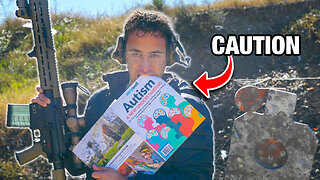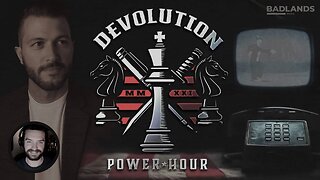Premium Only Content

The Peril of Believing What Others Don’t.
To believe what others do not is to step into dangerous territory. History is filled with visionaries and dissidents who dared to question prevailing narratives, and while some were eventually vindicated, many paid dearly for their courage. In today’s world—where information spreads instantly and conformity is often enforced not just by governments but by online mobs—the perils of believing differently are sharper than ever.
Against the Grain.
Believing what others don’t means going against the grain, cutting against the weave of accepted wisdom. It is stepping away from the herd, refusing to march with the crowd toward the cliff’s edge. On one level, this is an act of intellectual bravery: the willingness to question, to doubt, to seek truth where others refuse to look. But bravery is often punished, not rewarded. To break with the herd is to lose the protection of the herd. Once isolated, the believer becomes the target of ridicule, suspicion, or outright hostility.
The Social Cost of Dissent.
In any community, cohesion depends upon shared beliefs. Those who stray too far risk being branded as dangerous, delusional, or even traitorous. In modern society, where reputations are destroyed in hours online, stepping away from consensus can quickly mean being silenced, de-platformed, or socially exiled. The majority may not even need to prove you wrong—they simply need to portray you as "other," and the rest follows.
The Psychological Toll.
There is also the internal peril: the loneliness of conviction. To believe what others don’t means walking a road with little company, often facing endless self-doubt. Am I mad, or are they? The majority will insist you are wrong, even when your intuition tells you otherwise. This tension gnaws at the mind, sometimes leading to despair. To stand firm in your truth is exhausting, especially when those around you jeer or abandon you.
The Temptation of the Cliff’s Edge.
Ironically, following the herd feels safe precisely because it demands little thought. The masses may be charging toward a cliff, but the comfort of numbers dulls the fear of falling. The peril, then, is not only in believing differently, but also in refusing to believe differently. Conformity protects the body but imperils the soul. Believing what others don’t may be dangerous—but believing blindly what others do may be fatal.
A Double-Edged Sword.
Yet, it must be admitted: not every contrarian is a prophet. Sometimes believing what others don’t is folly, paranoia, or delusion. The danger is that society cannot always tell the difference between the visionary and the madman. Both stand outside the herd. Both insist upon a reality unseen by others. The line between genius and lunacy is thin, and those who cross it often find themselves crucified, exiled, or forgotten.
Conclusion.
The peril of believing what others don’t lies in its paradox: it is at once the most dangerous and the most necessary act. Without it, humanity would stagnate, trapped in the false safety of the herd. With it, individuals risk destruction at the hands of that same herd. To walk away from the cliff’s edge requires courage, but it also requires acceptance of the cost: misunderstanding, loneliness, even persecution. Yet history shows that progress, truth, and freedom have always been secured by those willing to face those perils.
-
 2:13:33
2:13:33
Side Scrollers Podcast
16 hours agoAsmongold SUED for Emotional Distress + Hasan REJECTED+ INSANE Plane Crash + More | Side Scrollers
74.7K22 -
 21:39
21:39
Nikko Ortiz
4 days agoI Take A North Korean Shooting
59.4K8 -
 23:01
23:01
GritsGG
14 hours agoWarzone Solo Dubular! Last Night Time Solo???
47 -
 22:47
22:47
The Pascal Show
11 hours agoTHEY’RE HIDING EVIDENCE?! Candace Owens EXPOSES Foreign Connection In Charlie Kirk Shooting
502 -
 LIVE
LIVE
Lofi Girl
3 years agolofi hip hop radio 📚 - beats to relax/study to
153 watching -

FreshandFit
11 hours agoLas Vegas Takeover!
159K13 -
 2:19:29
2:19:29
Badlands Media
11 hours agoDevolution Power Hour Ep. 404
62.9K30 -
 6:02:58
6:02:58
Drew Hernandez
1 day agoGOP COOKED INTO DENIAL & 12 ISRAELI-LINKED PHONES DETECTED AT UVU DAY OF CK EXECUTION?
38.8K22 -
 2:46:08
2:46:08
TimcastIRL
7 hours agoFAA To STOP Flights Over Shutdown, May CLOSE Airspace, Thanksgiving Travel APOCALYPSE | Timcast IRL
187K107 -
 1:56:20
1:56:20
Tucker Carlson
7 hours agoIt’s Time to Decide: America First or Lindsey Graham’s Psychosexual Death Cult?
98.5K388